From internal pipelines, drains are transported by external ...
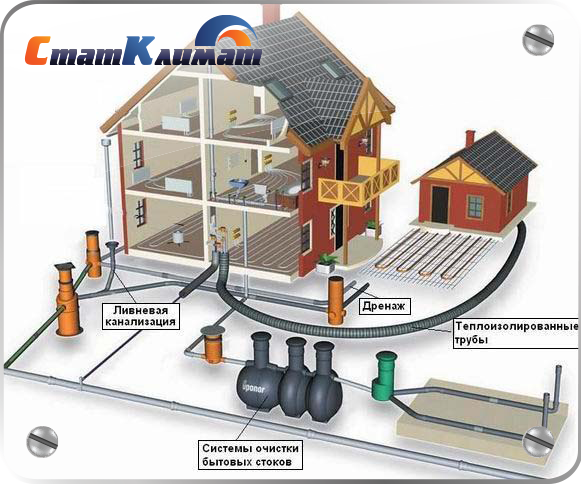
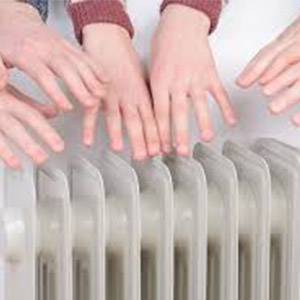
 With the arrival of heat and after completion of operation heating system utilities began preparing equipment for the new cold period. For this, the local authorities have developed a special program that includes:
With the arrival of heat and after completion of operation heating system utilities began preparing equipment for the new cold period. For this, the local authorities have developed a special program that includes: Monitoring the implementation of the program is also entrusted to the management companies and ZHEKi at the address of residence. If all the necessary measures are completed on time, this will ensure the timely supply of heat to apartments and other buildings.
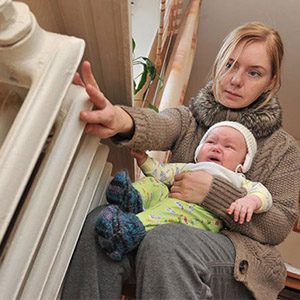 Previously, the heating season began on October 15 and ended on April 15. However, this turned out to be completely unprofitable, since temperature indicators are not the same in different regions of the country. For example, in the Urals already in August, the first frost sets in, and in the southern towns in September you can still sunbathe. As a result of this, the local authorities will regulate the heat supply process based on the climatic characteristics of their region.
Previously, the heating season began on October 15 and ended on April 15. However, this turned out to be completely unprofitable, since temperature indicators are not the same in different regions of the country. For example, in the Urals already in August, the first frost sets in, and in the southern towns in September you can still sunbathe. As a result of this, the local authorities will regulate the heat supply process based on the climatic characteristics of their region. However, there are norms prescribed in the law that apply to the whole territory of Russia:
Completion heating season, like its launch, lasts about seven days. First of all, the heat supply stops in administrative buildings, then in residential buildings and social facilities (kindergartens, schools, hospitals).
 The last heating season Moscow passed without serious accidents and incidents, with the exception of a pipe rupture in a residential building in the South-Eastern Administrative District, which resulted in several floors flooding. Fortunately, the cause of the flood was quickly eliminated and the heat supply resumed.
The last heating season Moscow passed without serious accidents and incidents, with the exception of a pipe rupture in a residential building in the South-Eastern Administrative District, which resulted in several floors flooding. Fortunately, the cause of the flood was quickly eliminated and the heat supply resumed. The beginning of the heating season this year, according to official sources, is planned for mid-September, since in the capital the air temperature does not rise very high even in summer. Moreover, Moscow has already prepared for this and its level of readiness is assessed excellently.
The timing start of the heating season clearly spelled out in Russian law.
However, although we usually say “when by law”, these rules should not be sought in the Law, but in Government Decreewhose number 354 with release date dated May 6, 2011.
According to law (or, more precisely, by government order) include heating in Russia in the fall, after the average outdoor temperature for 5 days has remained below 8 degrees (that is, five days will be kept at 7 degrees or less). If the above conditions are met, the heating must be turned on. on the sixth day.
In addition to temperature, the availability of heating networks to start heat also affects the possibility of heating. Usually, networks are cooked in the summer, they are crimped, equipment is changed. Now it’s hard to imagine that the reason for the delay in the start of the heating season was the slowness of utilities, but unfortunately no one is safe from accidents.
That is, with the technical readiness of the networks, heating in Russia by law includes:
* On the sixth day after maintaining the average daily outdoor temperature below 8 degrees.
This rule applies to apartment buildings with central heating (from a boiler room or a thermal power plant). If individual heating equipment is installed in the apartment building, then the owners can order the start of heat at any time at their discretion. At the same time, if no decision was made on their earlier start-up of the system, then the batteries will become warmer with them, along with everyone.
Our country is huge, and in different regions (and even in different parts of the same region) weather conditions can vary significantly. This applies both to the territory and time - in different years the weather behaves differently, and if last year, for example, October was warm, in this it can be very cold. That is why the beginning of the heating season in Russia is not tied to a specific date, but depends entirely on the weather.
It is impossible to predict exactly when it will get so cold at a particular point in Russia that it will not last five days to “cold” enough to turn on the heating. However, the approximate dates are the same from year to year.
Russia is in the harshest climatic conditions, and it is rather difficult to survive frosty and long winters without properly functioning heating. Spring, on the contrary, comes in different regions in different ways. And if somewhere people are already starting to feel at home uncomfortable with working batteries, then in other regions winter does not think to give up their rights, and a hot radiator is just the way.
Many of us are concerned about the question, according to what criteria and who decides to supply heat to the radiators of apartment buildings and stop this supply. Probably, each of us at least once wondered about who decides about the beginning and end of the heating period in cooperative homes. After all, if the concern for heat in a private house lies on the shoulders of the owners themselves, then in the case of central heating, everything is different.
The city local municipal authorities make such a decision, giving orders to the public utilities. And in Russian realities this most often happens in the month of October. Decisions are made locally, and the main catalyst for opening the heating season is the average daily temperature, which is kept at around 8 degrees Celsius and below for 5 days. To turn off the heating, respectively, reverse factors are necessary - the average daily temperature is above 8 degrees for more than 5 days. But at the same time, meteorological services should give a forecast that long-term colds will no longer return.
The decision to turn off the heating will be made individually for each region, depending on weather conditions. Whereas somewhere in Russia, spring is already showing its full potential, in many areas winter still holds its position. It is quite natural that residents of Voronezh, Vladivostok, Serpukhov, Angarsk, Kurgan, Kursk, Krasnodar, Krasnoyarsk, Perm, Lipetsk, Saratov and Sevastopol will feel the end of the heating season at different times. But we can say with confidence that in many cities of the country this will happen in April.

At the end of the heating season, there are always a lot of questions. Today we will try to understand and answer everything that is really important.
There are a number of laws that are worth noting first. If your home already has its own autonomous heating system, then the start and end dates for heating the living space are set directly by the owner of the room, that is, by you. The disadvantage of this type of heating is that you have to pay for electricity. Bask or save - you decide.
If the central heating system is installed in your house, then you can’t change the date of heating shutdown. The duration of the season in 2017 will depend only on external factors, that is, on the average daily temperature. The start of heating is usually done when on the thermometer you can see +8 degrees and below for five days. The end of the heating season depends on the same indicators - +8 degrees and above.
In 2017, a decree was already issued to turn off the heating in the following numbers:
The order in 2017, of course, has not been canceled, but in reality it is much more difficult to find out the specific numbers to complete the heating of the batteries. There are many reasons for this; here are some of the most obvious:
In the period when spring heat comes to replace the harsh winter frosts, you can see more and more open windows for airing in residential buildings. The contrast between the temperatures in the apartments and on the street is such that it creates a feeling of absolute stuffiness. This is especially true for those houses that have been built over the past 50 years. Such intense heating during this period significantly affects the amount of receipts for a communal apartment. Taking into account the fact that in recent years housing and communal services tariffs have been showing steady and steady growth (especially with regard to Russian cities with a population of over one million), and now the amount of payments has gradually exceeded reasonable limits, I want a clear understanding when heating systems will be turned off (especially in the case of when there is no real need for it).
According to the legislation in force in Russia, the beginning and end of the heating season has clear deadlines. However, no one is in a hurry to inform citizens about when exactly they will turn on / off heat in houses.
Every time the townspeople are at a loss when the batteries will become warm (at the end of autumn), and when the batteries are turned off (in the spring). At the same time, it is impossible to independently predict when the heating will turn on and off this year (the human factor plays an important role here).
To simplify the life of citizens, it will be enough to familiarize them with the relevant legislative acts, as well as with statistics of past periods. This will help clarify the question of when to wait for the end of the heating season and turn off the heating in 2017.
If the house is equipped with an autonomous heating system, then when to start and when to end the heating season the tenants themselves decide (the owners of the room). The only thing that can be negative here is the likely increase in energy consumption, which will naturally entail additional costs. In this case, the subscribers themselves decide what is more important - to bask or save on payments.
If the house is connected to a central heating system, then you cannot disconnect it yourself. In this case, the date the heating is turned off depends on external factors, namely the average daily ambient temperature. So, the beginning of the heating season occurs in the fall, at the moment when for 5 consecutive days the temperature does not exceed + 8 ° С. The end of the heating season also depends on the average daily temperature. It should be for 5 consecutive days higher than + 8 ° C.
To date, there is already a relevant resolution to turn off heating in 2017. So, heating will be turned off on the following dates using the example of large cities:
Immediately with the beginning of spring warming, many residents of the capital and other cities begin to be interested in the real days of turning off the heating. The following points are important here:
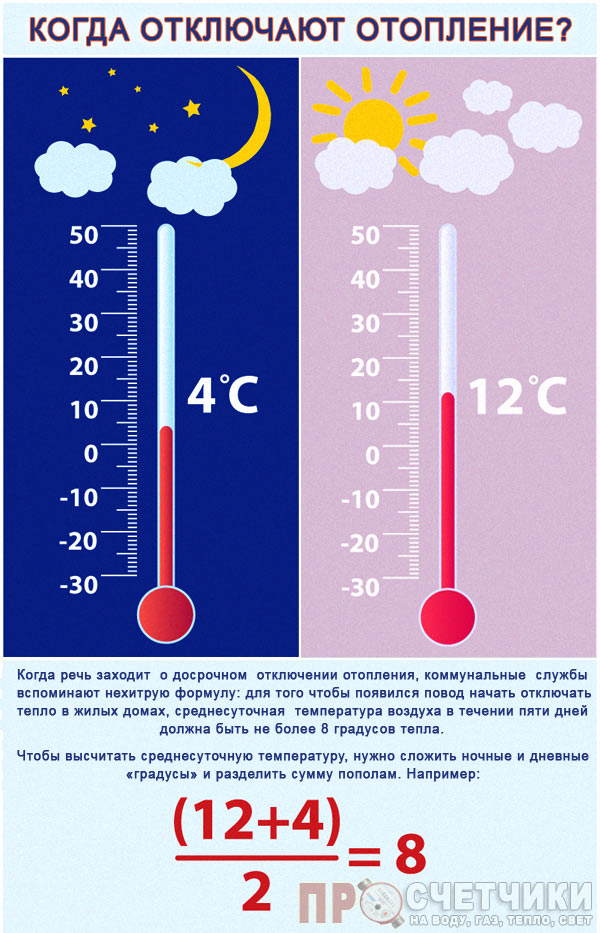
The end of the heating season and the cessation of heat supply to consumers are associated with significant costs of finance and human resources. The feasibility of such a decision is determined by the city authorities, focusing on average daily temperatures and weather forecasts for future periods. These indicators are objective, and no others will be taken into account when the heating is turned off.
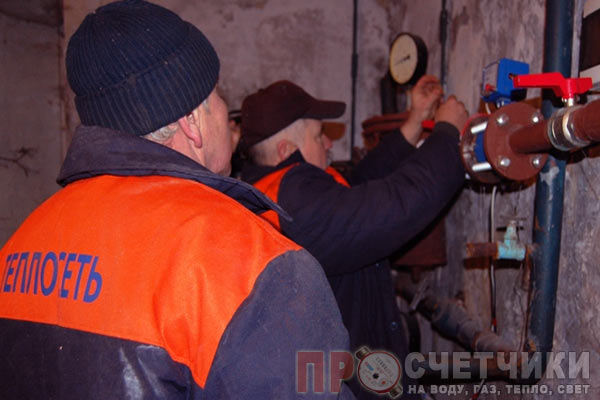
There are a number of objective reasons that indicate that untimely shutdown of centralized heating is not a rational measure. The main ones include:
From the information given above, it is clear that the improvement in weather conditions and their stability significantly affect the date the heating is turned off. However, in recent years, significant cooling has been observed more and more often in Moscow and the Moscow Region, which, according to meteorological services, fall in the month of April (when the heating is turned off).
Statistics data for the period 2007-2016 They say that in Moscow and the Moscow region heat is turned off annually in late April - early May. During this period, the ambient temperature in this region stabilizes at + 10 ° C.
Here are the exact dates (by years) when the heating was turned off in Moscow in previous periods:
In addition, it should be borne in mind that the process of shutting down heat begins with production enterprises. Further, residential houses are disconnected from centralized heating, and only after that are social facilities. As a rule, the time interval between shutdown of production facilities and residential buildings is 4-5 days.
To summarize the above, it should be noted that it is impossible to unequivocally answer the question of when the heating will be turned off in the spring of 2017, since this depends on weather conditions and temperature condition. For orientation, you can take last year's indicators. According to preliminary forecasts, it is possible to count on a heat cut-off in late April - early May 2017. Immediately after the establishment of the required temperature regime, the city authorities will take an appropriate decision, and then pass it on to the district subjects and housing and communal services in the field.
Ordinary subscribers can be advised to monitor the weather, weather forecasts, as well as relevant messages on television and in the media. However, it is possible to expect a blackout this year after the 20th of April.